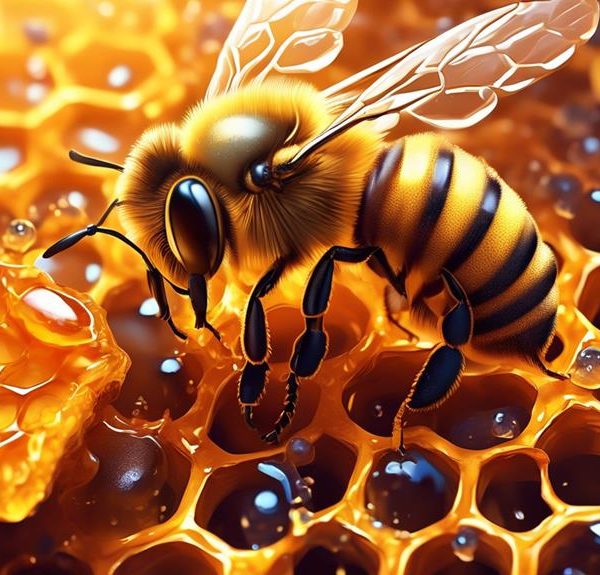Uncover the most amiable bee species and discover why some may be friendlier towards humans than you ever imagined.
Which Bees Are the Friendliest?
Imagine you're in a world where bees are your best friends. It might sound a little far-fetched, but believe it or not, not all bees are created equal when it comes to friendliness. You've probably encountered a variety of these buzzing creatures in your daily life, some more intrusive than others.
Have you ever wondered which of these insects are the most amiable? As we explore the behavior of different bee species, from the industrious honey bee to the docile mason bee, you'll discover the fascinating traits that make some bees more sociable towards humans.
And who knows, by the end of this, you might just become a bee enthusiast yourself.
Understanding Bee Behavior
To truly appreciate the friendliness of bees, you've got to understand their behavior. Bees aren't just friendly; they're social creatures. They live in colonies, work together, and follow a strict hierarchy. The queen bee leads, and the worker bees follow. It's a system that's worked for millions of years.
Look closer, and you'll see that bees communicate with each other. They use a sophisticated language of dances to relay information about food sources, threats, and more. It's a language you can't hear, but if you watch closely, you can see it. That's right, bees have a language. Isn't that amazing?
Bees also exhibit friendliness through their work ethic. They tirelessly collect nectar, pollinating plants and flowers in the process. And that's important for you too. Without bees, many of the foods you love wouldn't exist.
The Honey Bee: A Friendly Pollinator
Drawing from our newfound understanding of bee behavior, let's now turn our focus to the honey bee, a friendly pollinator that has a significant role in our ecosystem. These bees are vital to the survival of most of our plant species, as they help to pollinate about one-third of our food crops. Imagine a world without apples, almonds, or avocados – that's what it'd be like without our busy, buzzing friends.
Honey bees, contrary to what you might think, aren't naturally aggressive. They'll usually only sting in defense of their hive or if they feel threatened. You've likely seen them buzzing around your garden, going about their business without bothering anyone. They're more interested in the nectar of your flowers than in causing any sort of trouble.
You can even keep honey bees in your own backyard, which is a great way to support their dwindling populations. Remember, they're not out to get you. They're just doing their job, helping to keep our planet green and growing.
The Bumble Bee: Nature's Gentle Giant
Now, let's shift our attention to the bumble bee, nature's gentle giant, known for its distinctive buzz and calm demeanor. You'll often spot these fuzzy insects bobbing around your garden, diligently visiting flowers as they go about their day. Unlike some other species, bumble bees aren't aggressive, and they won't sting unless they feel threatened.
They're larger than most bees you've encountered, but don't let their size intimidate you. These creatures are incredibly gentle, and they play a crucial role in our ecosystem. Just like their honey bee cousins, bumble bees are fantastic pollinators. They're particularly good at buzz pollination, a method used to dislodge pollen from certain types of plants.
You see, while they're busy collecting nectar, they're also spreading pollen from flower to flower, helping plants reproduce. So, next time you're in the garden and spot a bumble bee, don't shoo it away. Instead, appreciate its hard work and the crucial role it plays in our ecosystem.
After all, without these gentle giants, many of our favourite fruits, vegetables, and flowers wouldn't exist. Bumble bees truly are nature's friendly, fuzzy workers.
The Mason Bee: A Harmless Neighbor
Switching gears, let's meet the mason bee, a harmless neighbor you'd love to have buzzing around your backyard. Unlike other bees, mason bees aren't aggressive. They're solitary creatures, meaning they don't have a hive or queen to protect, so they're less likely to sting. In fact, they'll only sting if squeezed or stepped on.
You'd be hard-pressed to find a better pollinator. Mason bees are incredibly efficient, pollinating up to 100 times more than honeybees. They're early risers too, hard at work while other bees are still snoozing.
Mason bees are called such because of their nesting habits. They use mud to construct small nests, often in holes in wood or hollow stems. They're not destructive, so you don't have to worry about them damaging your property.
Encouraging Friendly Bees in Your Garden
If you're keen on transforming your garden into a bee-friendly paradise, there are a few simple steps you can take. First, you'll need to plant a variety of blooming plants. Bees love diverse gardens, so mix it up with different colors, shapes, and sizes of flowers.
Second, avoid using pesticides. They're harmful not only to bees but also to other beneficial insects. If you can't get around using them, opt for organic or bee-friendly ones.
Third, provide a water source. Just like us, bees need water to survive. A shallow dish with a few stones for them to perch on will do.
Also, consider leaving some bare patches in your garden. Certain types of bees, like the friendly mason bees, prefer to nest in the ground.
Lastly, if you're willing to go the extra mile, install a bee house. This gives bees a safe place to rest and lay their eggs.
Conclusion
So, you've learned that not all bees are out to sting you. Honey bees, bumble bees, and mason bees are actually quite friendly and essential to our ecosystem. By understanding their behavior and encouraging them in your garden, you're helping nature and reducing fear.
Remember, they're more interested in pollen than people. So, don't be afraid to share your space with these friendly bees. They're just doing their job, just like you.


